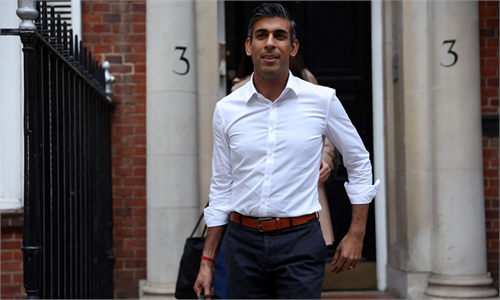British Finance Minister Jeremy Hunt announced a string of tax increases and tighter public spending in a tough budget plan on Thursday that he said was needed after the blow dealt to the country's fiscal reputation by former prime minister Liz Truss.
Hunt told parliament that the economy was already in recession and was forecast to shrink in 2023 but there was no way to avoid painful fiscal medicine to ensure Britain could build on the recent restoration of calm in financial markets.
"Credibility cannot be taken for granted and yesterday's inflation figures show we must continue a relentless fight to bring it down, including an important commitment to rebuild the public finances," he said.
Hunt announced changes to tax rules that will mean more people pay basic income tax, a lower threshold for paying the top rate of income tax, and a cut in tax-free allowances for earnings from dividends.
He froze until 2028 a threshold at which employers must start to pay social security contributions, meaning companies will have to pay more.
A levy on the profits of energy companies would be increased to 35 percent from 25 percent from January 1 until 2028, and a new temporary 45 percent tax would be imposed on electricity generators, to raise a total of 14 billion pounds ($16.52 billion) in 2023, Hunt said.
The belt-tightening comes against the backdrop of a weak outlook for the economy.
Gross domestic product is now expected to contract by 1.4 percent in 2023 compared with a projection for growth of 1.8 percent in the previous outlook published in March by the independent Office for Budget Responsibility (OBR).
Since then, Britain's economy has come under strain from an inflation rate now above 11 percent, a slowing global economy and about of severe financial market volatility during Truss' brief term as prime minister.
Hunt said the OBR forecasts laid out "starkly the impact of global headwinds on the UK economy."
Hunt told parliament that the economy was already in recession and was forecast to shrink in 2023 but there was no way to avoid painful fiscal medicine to ensure Britain could build on the recent restoration of calm in financial markets.
"Credibility cannot be taken for granted and yesterday's inflation figures show we must continue a relentless fight to bring it down, including an important commitment to rebuild the public finances," he said.
Hunt announced changes to tax rules that will mean more people pay basic income tax, a lower threshold for paying the top rate of income tax, and a cut in tax-free allowances for earnings from dividends.
He froze until 2028 a threshold at which employers must start to pay social security contributions, meaning companies will have to pay more.
A levy on the profits of energy companies would be increased to 35 percent from 25 percent from January 1 until 2028, and a new temporary 45 percent tax would be imposed on electricity generators, to raise a total of 14 billion pounds ($16.52 billion) in 2023, Hunt said.
The belt-tightening comes against the backdrop of a weak outlook for the economy.
Gross domestic product is now expected to contract by 1.4 percent in 2023 compared with a projection for growth of 1.8 percent in the previous outlook published in March by the independent Office for Budget Responsibility (OBR).
Since then, Britain's economy has come under strain from an inflation rate now above 11 percent, a slowing global economy and about of severe financial market volatility during Truss' brief term as prime minister.
Hunt said the OBR forecasts laid out "starkly the impact of global headwinds on the UK economy."



